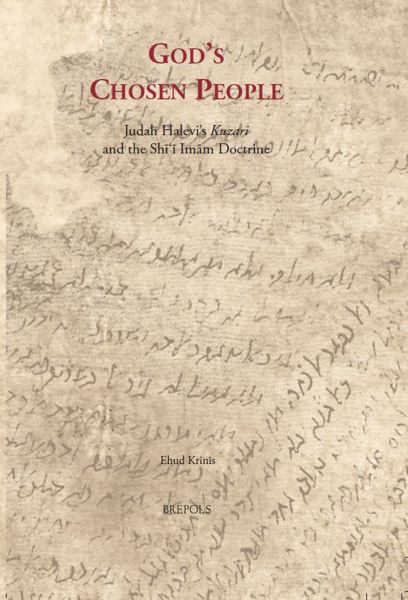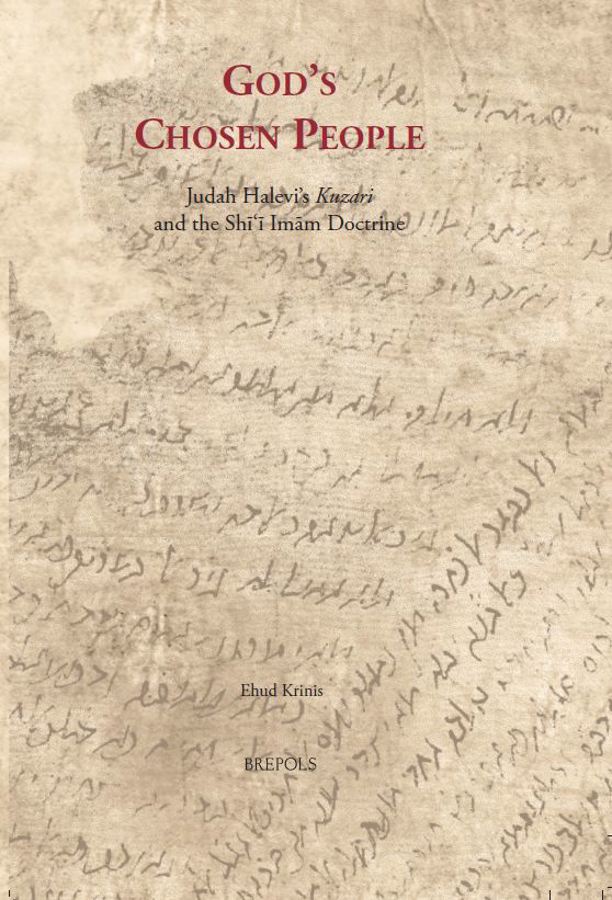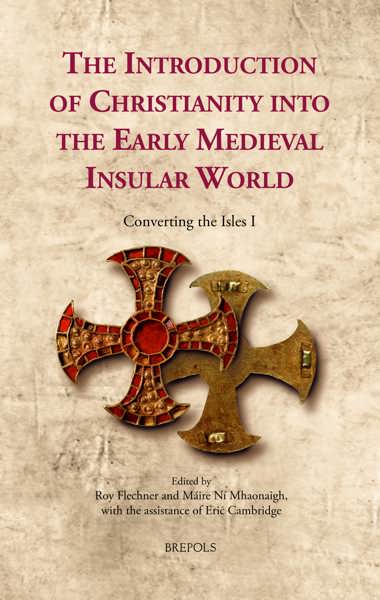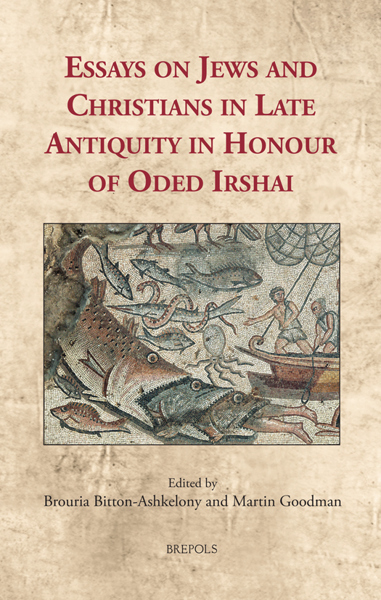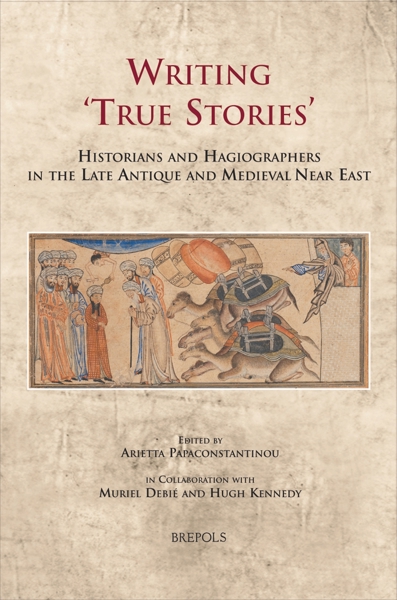
- Pages: 352 p.
- Size:156 x 234 mm
- Language(s):English, Arabic, Hebrew
- Publication Year:2014
- € 100,00 EXCL. VAT RETAIL PRICE
- ISBN: 978-2-503-54396-3
- Hardback
- Available
- € 100,00 EXCL. VAT RETAIL PRICE
- ISBN: 978-2-503-56069-4
- E-book
- Available
The first ever monographic study on the theological encounter of Judaism with Shīcism through an explorartion of Judah Halevi’s reliance on basic themes of Shīcism in the presentation of Judaism in his classical treatise, The Kuzari.
"L'avantage de la démarche suivie par Krinis est de fournir un ouvrage au contenu très riche, qui intéressera aussi bien les spécialistes du judaïsme médiéval que les chercheurs dans le domaine chiite. Il faut saluer la profonde connaissance que l'auteur a des traditions juives et chiites. Ses analyses doctrinales, appuyées par de nombreuses citations, sont minutieuses, précises et nuancées." (Daniel De Smet, dans: Studia Islamica, 109 (2014), p. 333-337)
"(...) the present book is an informative addition to a series of studies that are exploring in increasing detail the conditions of the intercultural entanglements of families of faith within pre-modern Abrahamic monotheism (...)" (Nader El-Bizri , in: Journal of Islamic Studies, 26.2, May 2015, p. 208-211)
"There are several aspects of the book that make it important for students of religion in general and Jewish Studies in particular." (Norman Simms, in: Parergon, 31.2, 2014, p. 227-228)
“This is a magnificent work of scholarship, the most comprehensive and bold project to date of situating Judah Halevi’s Kuzari within its context in Islamic civilization (…) This detailed work of scholarship should be studied and pondered slowly and carefully for its depth and richness. It is essential reading for students of Halevi and all those fascinated by the intertwined nexus of medieval Jewish and Islamic thought.” (Diana Lobel, in the Journal of Semitic Studies, 61/2, 2016.10)
« Ehud Krinis y déploie une connaissance remarquable des sources primaires (aussi bien juives que musulmanes et plus singulièrement shiʿites) et des études secondaires de toutes sortes. Le sujet qu’il traite (…) il le problématise magistralement à nouveaux frais en ouvrant de nouvelles et importantes pistes de recherche. Son remarquable livre (…) renouvellent magistralement notre connaissance de l’influence de la pensée et des doctrines shiʿites dans divers milieux intellectuels et spirituels de l’Espagne musulmane. » (Mohammad-Ali Amir-Moezzi, in Jerusalem Studies in Arabic and Islam, 43, 2016, p. 392-393)
« Complété par une bibliographie, un index des passages du Kuzari et un index général, cet ouvrage novateur, qui prolonge des travaux de Salomon Pinès et leur donne un développement inattendu, est de ceux qui obligent à se souvenir que la pensée juive ne peut s’étudier seulement a partir des sources hébraïques ou araméennes et d’Aristote. » (Jean-Pierre Rothschild, dans la Revue des études juives, 175/3-4, 2016, p. 469)
The systematic formulation of the status of the People of Israel as the Chosen People of God stands at the heart of Judah Halevi’s famous theological and polemical treatise – the Kuzari.
The idea of the Chosen People is an ancient one and is deeply rooted in Judaism. Through a wide-ranging textual and phenomenological investigation, this book highlights the novel and systematic presentation of the Chosen People in the Kuzari and shows how Judah Halevi draws, in a creative manner, on terms, concepts, and themes borrowed from the Shī‘ī doctrine of the Imām as presented in Shī‘ī literature.
This book presents a historical perspective for understanding the basis of Judah Halevi’s attraction to Shī‘ī theology, with its unique category of God’s Chosen. The polemical argument over the issue of the legitimate successor to leadership in early Islam, as well as the debate around the legitimate successor-group in medieval interreligious disputes, emerges as the historical background for the seemingly surprising link between the Shī‘ī Imām doctrine and the idea of the Chosen People in Judah Halevi’s thought. This link on the one hand portrays Halevi as a bold, original thinker and, on the other, portrays the Shī‘ī Imām doctrine as exceedingly fruitful and reaching beyond the bounds of Islam.
Contents
Foreword
Part I. Background
Chapter 1. Introduction
Chapter 2.The Shī‘ī Heritage
Chapter 3. Jewish Exposure to the Shī‘ī Heritage
Part II. Continuity
Chapter 4. The Unique Individuals (Afrād) Model in the Kuzari and its Shī‘ī Context
Chapter 5. Evidence for the Shī‘ī Doctrine
of Primordial Chosenness in the Kuzari
Chapter 6. God’s Proof (Ḥujja)
Part III. Hierarchy and Mediation
Chapter 7. The Features of Hierarchism in the Kuzari and its Shī‘ī Context
Chapter 8. Superhuman Attributes of the Chosen: ‘Divine Humans’ on the Upper Level of the Hierarchy
Chapter 9. Mediation
Part IV. Exclusivity and Dependence
Chapter 10. Shī‘ī Aspects of the Concept of the Divine Order (al-amr al-ilāhī) in the Kuzari
Chapter 11. The God of Creation and the God of History
Part V. Legitimate Succession and Chosenness
Chapter 12. The Question of Legitimate Succession and its Background
Chapter 13. The Question of Legitimate Succession in the Kuzari
Part VI. Conclusion
Chapter 14. General Assessment of the Nature of the Shī‘ī Influence on the Kuzari
Chapter 15. Shī‘ī Trends and the Multifaceted Nature of the Kuzari
Appendix. The Linguistic and Literary Uniqueness
of Book I of the Kuzari
Bibliography
Index of Passages from the Kuzari
General Index
